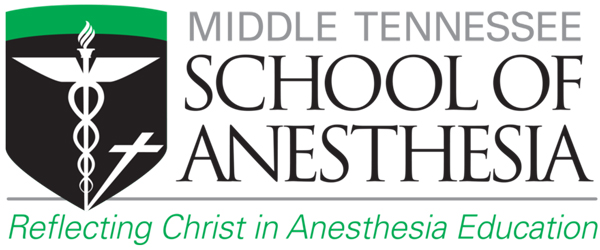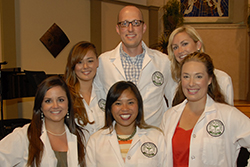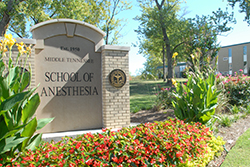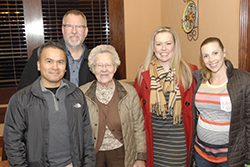Airways
April – June 2017
Acute Surgical Pain Management Fellowship ramping up
New faculty and clinical sites added
Photo: Bill Johnson, DNAP, CRNA, Director of MTSA’s Acute Surgical Pain Management Fellowship
Middle Tennessee School of Anesthesia has announced major developments in its Acute Surgical Pain Management Fellowship (ASPMF), including contracts with more than 20 new faculty members and several new clinical sites. The first cohort is scheduled to begin this summer, with the application period opening April 10.
MTSA developed the Fellowship in partnership with the American Association of Nurse Anesthetists (AANA) to advance the knowledge and skills of Certified Registered Nurse Anesthetists (CRNAs) in acute surgical pain management and prepare them to help meet the growing need for this evidence-based approach in the United States.
“I’m very excited about the progress we’re making on all fronts as we launch the Fellowship,” said Bill Johnson, DNAP, CRNA, MTSA’s director of the program. “The faculty we’ve brought onboard are truly multidisciplinary and include anatomists, physical therapists, physicians, pharmacologists, hospital administrators, CRNAs and many more. The program is one-of-a-kind, and it’s addressing a significant need in our profession.”
In addition to the faculty and clinical sites, Johnson has tapped Neuraxiom LLC to provide illustrations and animations for each regional anesthetic block. Under the direction of its founder, Jack Vander Beek, the company developed one of the first websites dedicated to using ultrasound to visualize the epidural space, mapping anatomy in selected block areas, and developing new anesthesia techniques.
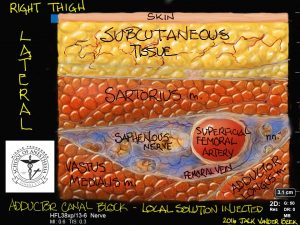
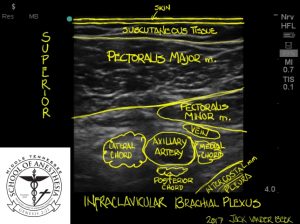
Neuraxiom is providing these illustrations, among others, as part of the Acute Surgical Pain Management Fellowship curriculum.
Addressing Current Issues in Anesthesia
According to Johnson, one of the main goals of the Fellowship is to address a hot topic in the medical community: opioid abuse.
“Demand continues to grow for improving patient outcomes during surgery and minimizing opioid use in the postoperative period,” Johnson said. “Experts have shown a direct correlation between the severity of someone’s postoperative pain and the likelihood that they will develop chronic pain later. So the focus is not only on minimizing the patient’s postoperative pain in the first week or two through some of these techniques that we’re teaching, but it’s also a great way to reduce incidents of chronic pain that continues months or years afterwards and leads to dependence on prescription pain medication.”
Interest in the program is strong, based on the number of potential candidates who have requested information and updates. The program will include two cohorts per year, with 12 fellows per cohort. Applications opened April 10, with interviews tentatively scheduled for late May. The first cohort is scheduled to start the program in mid- to late-July.
Johnson said he’s in the final stages of negotiations with several additional clinical sites for the Fellowship. “A side benefit of bringing on more sites is that they will be accessible to students of MTSA’s other programs as well. It will allow us to expand and make additional rotations available in a wider geographic area across the country,” he added.
Fellowship Curriculum
The ASPMF consists of a classroom component offered via distance education (didactic education) and a clinical component (proctored hands-on clinical experience offered through one or more clinical sites). Fellows will learn innovative techniques including multimodal and interventional therapies to manage acute surgical pain, while developing business management proficiency. The didactic program is divided into three courses:
COURSE 1: Foundations of Acute Pain Management
- Orientation (1 week)
- Nonallopathic Principles of Acute Pain Management (2 weeks)
- Physiology of Pain and Neurologic Assessment and Evaluation of Pain (3 weeks)
- Pharmacology of Acute Pain Management (4 weeks)
COURSE 2: Techniques of Acute Pain Management (10 weeks)
COURSE 3: Acute Pain Management Education, Business and Evidence Based Practice
- Adult Pedagogy for the Acute Pain Mentor (1 week)
- Cadaver Experience (1 weekend)
- Research and Enhanced Surgical Recovery from Anesthesia (3 weeks)
- Business Aspects of Acute Pain Management (3 weeks)
“I’ve been teaching regional anesthesia for 18 years, both in academic and clinical settings. Seeing the positive results of our profession is very rewarding, especially as outcomes improve, complications are reduced, and patients have a better quality of life,” Johnson said. “I’m excited to see even more improvements as we launch this Fellowship and help CRNAs become experts in acute surgical pain management.”
More information on the Fellowship, including registration and a list of faculty, is available at www.mtsa.edu/fellowship.
President's Message
Going Beyond Academics
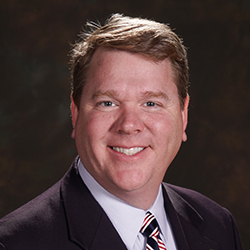
Chris Hulin
DNP, MBA, CRNA
President
At MTSA, we’re in the business of equipping nurse anesthetists for a successful and fulfilling career. It’s a given that our academic program must compete with top-tier institutions throughout the country – and it certainly does.
I’m proud of the fact that MTSA has one of the top programs in the country for nurse anesthesia. Our curriculum is exceptional, the quality and quantity of clinical experience for our students is unparalleled, and our faculty and staff are outstanding on every level. We stand firm on a proud tradition of Christian ideals and service to our community.
Beyond that, our faculty and students are engaged in a wide range of unique efforts that continue to put us ahead of the pack. One of our main goals is to be an asset for CRNAs even after they earn their degree. We’re helping to make a direct impact on the profession on a number of fronts that serve as a resource for everyone in the nurse anesthesia community. Here are just a few examples:
- Acute Surgical Pain Management. We are partnering with large institutions to prepare their CRNAs to administer acute surgical pain management (ASPM) techniques with patients. MTSA continues to be the national leader in ASPM as we collaborate with the American Association of Nurse Anesthetists (AANA) to offer the ASPM Fellowship.
- Public Policy & Advocacy. Every student is required to complete an advocacy assignment as part of the curriculum. In addition, many have participated in the Tennessee Association of Nurse Anesthetists (TANA) “day on the hill” to educate state legislators on the practice of nurse anesthesia and how it affects our healthcare delivery system. Our students are active in meetings in Washington D.C. with the AANA, along with other public policy initiatives. These activities lead to many opportunities to advocate and support the nurse anesthesia professional.
- Advanced Cadaveric ASPM Workshop. In an effort to further support the advanced practice and education of regional anesthesia, MTSA continues to provide advanced training through cadaveric ASPM workshops. Hundreds of CRNAs from across the country have come to campus to learn these skills. Another workshop is planned for May 7, and details can be found in this issue of Airways.
- Transesophageal Echocardiography (TEE). MTSA has purchased a Heartworks TEE simulator and will be developing learning opportunities for CRNAs to use this modality to teach advanced physiological concepts and clinical patient assessments.
- Continuing Education. To recognize the commitment and dedication of Anesthesia Technicians, MTSA is partnering with Metropolitan Medical Services and Spacelabs Healthcare to bring continuing education sessions for this group to our campus. MTSA is pleased to help provide this learning opportunity for these important anesthesia team members and professional colleagues.
And that’s just a small sample of what we’re doing. Our future plans also include educating the community on acute surgical pain management by hosting a symposium that brings together thought leaders in pharmacology, physical therapy, multimodal therapy and other specialties. Stay tuned for more information as we work on this and other opportunities to showcase the importance of nurse anesthesia.
As president I’m always challenging myself and our team to go beyond the standard academic offering. But rest assured we continue to maintain focus on the institution’s strategic goals. We’re keeping a steady hand as we introduce the Doctor of Nurse Anesthesia Practice degree to ensure a successful implementation, while recognizing that the success of current and future students is the highest priority. I encourage you to find ways of engaging in these efforts to help our profession maintain a sustainable career-growth trajectory. Thanks for your ongoing interest and support!
Scholarly Project Review
A Useful Alternative to Epidurals
A Review of DNAP Graduate Bryan Anderson’s Scholarly Project

Bryan Anderson
DNAP, CRNA
An epidural is the most common analgesia during childbirth, but what about women who can’t have one due to contraindications? Bryan Anderson, a 2014 graduate of MTSA’s DNAP program, set out to explore an alternative with his scholarly project: The Use of Remifentanil as the Primary Agent for Analgesia in Parturients for whom Neuraxial Anesthesia is Not an Option.
The purpose of his project was to examine whether use of the opioid remifentanil in lieu of an epidural during childbirth was a viable option and how its application might be made more widely available.
“As a practitioner, I administer epidurals all the time,” Anderson said. “However, on the rare occasion when I encounter a patient who can’t have one, I wanted to be able to offer other options instead of saying, ‘Sorry, I can’t help you.’ So that’s how this project came about. I wanted to find out the best way to use remifentanil and how to bring it into my practice.”
During his research, Anderson found that remifentanil is, in fact, a safe alternative to an epidural, although large-scale studies with rigorous guidelines and protocols need to be conducted to uncover more optimal uses of the drug.
As part of the project, Anderson provided an outline of recommendations for anesthesia providers that desire to use remifentanil for labor analgesia. It includes the recommended mixture, dosing, implementation and monitoring to ensure safe application.
“There’s research out there on using remifentanil, but it’s not readily available. Putting it all together in one place makes it easier for practitioners to make that happen,” he said.
Anderson’s project also examined the physiology of labor pain, the pharmacology of remifentanil, and factors that make neuraxial anesthesia a non-option. His review of the literature showed that the use of remifentanil is more effective than IV meperidine but less effective than an epidural.
Another important factor that Anderson uncovered is the cost associated with not only the drug but also with implementation. This potent, short-acting narcotic is more expensive when compared to less efficacious narcotics or local anesthetics traditionally used in the management of labor pain. Additional equipment and staff are needed, which further increases in the cost.
“Going forward, we really need to do more continuing education to disseminate this information to practitioners,” Anderson added. “Our goal is to make this method of obstetric pain management more available for patients throughout the country, if it’s a good fit for the particular circumstances. It all comes down to providing the best patient care possible.”
Anderson is an independent anesthesia provider based in the Memphis area. He and his wife, who is also a practicing CRNA, travel to clinics throughout the southeast. He graduated from the University of Mississippi School of Nursing in 2007. He received his Master of Science in Nurse Anesthesia from MTSA in 2011 and completed his DNAP at MTSA in 2014.
Following are excerpts from a broader discussion with Anderson related to his scholarly project.
Airways: What challenges did you face while conducting the research and completing the project?
Bryan Anderson: It was a major undertaking. The doctoral program at MTSA itself was rigorous. It’s difficult to do all your other class work, focus on the paper, and do all the research, reading and synthesis. On top of that I’m a practicing CRNA, as is my wife. We were both working during that time, and we actually moved during that time as well. You have to find a way to balance all the academics with real life.
Airways: What role did the faculty and your advisors play during the program?
B.A.: As many find out when undertaking a doctoral project, the original focus was different, and you end up adjusting as you go through the process. Dr. Larry Lancaster was involved early on with our cohort of doctoral students, and he was able to aim us in the right direction, helping as we distilled our ideas.
My advisors were Dr. Rachel Brown and Dr. Michael Vollman, who were both instrumental in the process. Dr. Vollman brings years of expertise and was able to help focus, shape and guide the project. And Dr. Brown brought a unique perspective as practitioner. Working with them together, I really felt I had a great team there guiding me and helping refine and revise. I also received a lot of support from Dr. Amy Gideon. She was helpful in tracking down the published sources, which weren’t always easy to find. The process was most certainly not a one-man show.
Airways: As a practicing CRNA, what professional experiences informed your interest in the subject?
B.A.: I’ve always had an interest in obstetrical anesthesia. It’s a very rewarding specialty to practice, and I really enjoy it. But sometimes I would care for patients who weren’t able to have an epidural. I would have to tell them, ‘Sorry, I wish I could help but I don’t have a viable alternative for you during your labor and delivery.’ That’s a difficult thing to have to say. So I wanted to change that. And through this project, I learned a lot, which continues to make my experience in nurse anesthesia even more rewarding.
Advanced Cadaveric Ultrasound-Guided Anesthesia Workshop offered
- Sunday, May 7, 2017; 8 a.m. – 5 p.m.
- A block of previously reserved seats opened up and are now available
- Space is limited
- Cost: MTSA alum or clinical proctors: $275, all others: $300
- Eight (8) Hour Workshop
- AANA approval for eight (8) Class A CE credits
Cadavers will be utilized for needling, ultrasound instruction, administration of block medium, and catheter insertions. Workshop content will consist of both lecture and hands-on demonstration and instruction.
Register at www.mtsa.edu/non-degree.
The following blocks will be taught and demonstrated: fascia iliaca compartmental block, adductor canal approach to the saphenous nerve, obturator nerve block, lateral femoral cutaneous nerve block, quadratus lumborum, and the paravertebral nerve block.
Anatomists from a local university (trained as PhDs and DPTs) will be performing the dissection and instruction of the anatomy related specifically to regional anesthesia. These highly skilled anatomists understand the needs of CRNAs for advanced surgical pain management and will reveal and dissect exactly what is needed for this specialized approach.
Faculty for the daylong workshop includes Bill Johnson, DNAP, CRNA, Director of the Acute Surgical Pain Management Fellowship at Middle Tennessee School of Anesthesia, with other faculty including Patrick Moss, DNAP, CRNA; Stace D. Dollar, MS, CRNA; and John M. Edwards III, MS, CRNA.
For more information, contact Bill Johnson at (615) 732-7846 or bill.johnson@mtsa.edu.
MTSA transitions from Master’s to Practice Doctorate Program
New 36-month program represents evolution of academic offering

Beginning in January 2018, MTSA has plans to offer the 36-month Practice Doctorate program to registered nurses.
Middle Tennessee School of Anesthesia is phasing out the Master of Science with a Focus in Anesthesia program and will transition to the Doctor of Nurse Anesthesia Practice (DNAP) program with the next class, which will begin in January 2018 pending final approval by the Council on Accreditation of Nurse Anesthesia Educational Programs (COA).
“The nurse anesthesia profession is the first, in the family of advanced nursing degrees, to require practice entry-level education to be a doctoral degree by the year 2022,” said Maria Overstreet, PhD, RN, Dean at MTSA. “We began preparation for this transition several years ago with the introduction of the DNAP completion degree, beginning in 2013.”
Practice Doctorate Program
Pending COA approval, MTSA will offer the DNAP Practice Doctorate program to registered nurses. The program is a full-time course of study for 36 consecutive months. Following the first online semester all subsequent semesters require Middle Tennessee residency. In the third semester the students begin a rigorous clinical rotation process that offers students a vast array of clinical experiences in the peri-anesthesia setting, which continues throughout the remainder of the program.
The Practice Doctorate curriculum is designed to apply the scholarly process for translating evidenced based research into clinical practice. The scholarly project is a culmination of all course work during the program exemplified in a professional electronic portfolio. In addition, students produce a nurse anesthesia quality improvement project in one of the following areas: clinical practice, education, administration or business management.
The Practice Doctorate application cycle opened March 1. The deadline to have all application paperwork submitted is June 30, 2017. The COA is due to make its final decision for accreditation in June 2017.
Doctorate Completion Program
For licensed CRNAs, MTSA is continuing to offer a Doctor of Nurse Anesthesia Practice degree as a “completion” program in a modified online format where students come to campus once per semester for three to four days, then return home to complete the coursework online. The program can be completed in as early as one year of full-time study or part-time over two years.
The application cycle opened on Jan. 1. The deadline to complete the application and have all paperwork submitted has been extended to May 31.
“This move to Practice Doctorate as an entry-level education requirement for CRNAs will change how CRNAs practice. MTSA students will graduate with a Doctoral degree, the highest clinical practice degree in nursing. I look forward to being a part of this education movement that advances nurse anesthetists’ education and practice,” Overstreet said.
More information about both doctorate programs is available at www.mtsa.edu/academics.
4th Annual Mission & Awards Gala
Presented by Anesthesia Medical Group

MTSA’s Mission & Awards Gala will be held at the brand new Westin Nashville.
The 4th annual MTSA Mission & Awards Gala presented by Anesthesia Medical Group will be held Thursday, May 4, at the brand new Westin Nashville. Continuing the tradition from previous years’ events, proceeds from the 2017 Gala will benefit MTSA’s mission initiatives, including a Haiti trip planned for later this year.
Emceed by NewsChannel 5 Sports Anchor Steve Layman, the evening will include a reception, dinner, entertainment and award ceremony. Entertainment will feature singer-songwriter Neil Thrasher and friends with an acoustic performance. The event is open to all including alumni, faculty, students, physicians, medical groups, corporations and individuals.
Five awards will be presented as nominated by MTSA alumni and community friends to the following awardees:
- Mary Elizabeth “Ikey” DeVasher Alumni Distinguished Service Award: Dina Filomena Velocci, DNP, CRNA
- Nevin Downs, MD Leadership Award: Kenneth Wayne Hutchinson, II, AD, CRNA
- Clinical Excellence Award: Tammy Hooper Freehling, MSN, CRNA
- Philanthropy Award: Harold Greene, RHU, CLTC
- Mission & Heritage Award: Rod Schwindt, MS, CRNA
A block of rooms at The Westin Nashville has been reserved for guests wishing to stay overnight. Special pricing is $269 per night and must be reserved before April 20 by calling the hotel at (615) 248-2800. Mention the MTSA Gala to receive the discount rate.
For more information about the event in general, contact the MTSA Advancement & Alumni Office at (615) 732-7674, or visit www.mtsa.edu/gala.
When: Thursday, May 4, 2017
Where: The Westin Nashville, 807 Clark Place, Nashville, TN 37203 (Valet parking is available for $8)
Reception: 6 p.m.
Dinner: 6:45 p.m.
Entertainment: Neil Thrasher & friends
Dress: Black tie optional
Ticket Price: $100 each
Table Price: $1,000 (10 guests)
Ticket Contact: (615) 732-7674 or www.mtsa.edu/gala
Inaugural Sporting Clay Tournament
All levels of experience welcome for fundraising event
After you’ve enjoyed MTSA’s Mission & Awards Gala, join in the fun at the inaugural Sporting Clay Tournament the following day, on Friday, May 5, at the Nashville Gun Club.
This unique event is for all levels of experience – from those who have never shot a gun to expert sharpshooters. Teams of five people will compete on a course specially designed for the recreational fun shooter. An awards luncheon will follow the tournament. All ammunition and equipment is included.
Proceeds benefit MTSA’s Mission Initiative in Haiti and local communities.
When: Friday, May 5, 2017
Where: Nashville Gun Club, Sporting Clay Complex, 1100 County Hospital Rd., Nashville, TN 37218 (Located off Briley Parkway, Bordeaux area)
Registration: 8:30 a.m.
Tournament Starts: 10 a.m. (followed by awards luncheon)
Ticket Price: $150 each
Team Price: $750 (5 people)
Ticket Contact: (615) 732-7674 or www.mtsa.edu/sportingclay
14th Annual MTSA Golf Classic
Save the date!

Join us for the 14th Annual MTSA Golf Classic on Thursday, Sept. 21, 2017, at the Hermitage Golf Course – General’s Retreat.
Schedule:
10:30 a.m.: Registration opens
12:00 p.m.: Lunch
1:00 p.m.: Shotgun Start
Awards & Dinner to follow event
Format: 4-person scramble
To reserve your team or sponsorship, please contact Jim Closser at (615) 732-7674 or email jclosser@mtsa.edu. More information is available at www.mtsa.edu/golf.
Proceeds benefit MTSA’s Mission Initiative in Haiti and local communities.
Master’s application statistics for Class of 2017-2019
Total applications: 265
Invited to interview: 186
Interviewed: 130
Alternates selected: 6
Alternates accepted: 6
Alternate selected but refused: 1
Withdrew after deposit paid: 0
Re-applicants: 21
Re-applicants invited/interviewed: 13/11
Re-applicants accepted: 5
Total class: 72
(Applied/Accepted)
Avg years ICU experience: 3.22/3.0
Avg GPA: 3.32/3.42
CCRN: 146/48
Total men: 114/34
Total women: 151/38
Applicants by State
Alabama: 28
Arkansas: 3
Arizona: 1
California: 2
Colorado: 4
Florida: 3
Georgia: 24
Iowa: 1
Illinois: 6
Indiana: 8
Kansas: 1
Kentucky: 19
Louisiana: 5
Maryland: 4
Michigan: 2
Minnesota: 1
Missouri: 5
Mississippi: 7
North Carolina: 3
New York: 3
Ohio: 2
Oklahoma: 3
Oregon: 1
Pennsylvania: 2
South Carolina: 2
Tennessee: 90
Texas: 17
Utah: 4
Virginia: 5
Washington: 5
Wisconsin: 1
West Virginia: 1
Accepted by State
Alabama: 3
California: 2
Colorado: 2
Georgia: 1
Kansas: 1
Kentucky: 8
Louisiana: 2
Missouri: 1
Mississippi: 2
North Carolina: 1
Oklahoma: 1
Tennessee: 39
Texas: 4
Utah: 1
Virginia: 1
Washington: 3
Applicants
Out of State + TN >100 mi.: 202, 76%
TN <100 mi.: 63, 24%
All TN: 90, 34%
Accepted
TN >100 mi.: 11, 15%
TN <100 mi.: 28, 39%
All TN: 39, 54%
Out of State + >100 mi.: 44, 61%
President Hulin named to National Advisory Council on Nurse Education and Practice
Middle Tennessee School of Anesthesia President Chris Hulin has been appointed to the National Advisory Council on Nurse Education and Practice (NACNEP), which advises the U.S. Department of Health and Human Services (HHS), as well as Congress, on policy issues related to nursing.
Hulin is one of only 23 appointed to the panel, including university faculty, government officials, and healthcare and insurance executives. A majority of the group’s members are nurses.
“As a CRNA, I’m honored to be appointed to NACNEP,” Hulin said. “But more importantly, I’m excited that MTSA has a seat at the table on issues of national importance in our field. It shows that we continue to lead the country in nurse anesthesia education.”
NACNEP advises and makes recommendations to the HHS Secretary and Congress on policy matters in connection with Title VIII of the Public Health Service Act, including a range of issues relating to the nurse workforce, nursing education and nursing practice improvement. The panel’s efforts provide guidance on legislation and general regulations.
The group has responsibility for a wide range of activities in support of nursing education and practice which include:
- Enhancement of the composition of the nursing workforce
- Improvement of the distribution and utilization of nurses to meet the health needs of the nation
- Expansion of the knowledge, skills and capabilities of nurses to enhance the quality of nursing practice
- Development and dissemination of improved models of organization, financing and delivery of nursing services
- Promotion of interdisciplinary approaches to the delivery of health services particularly in the context of public health and primary care
“I look forward to lending my voice on a national level on behalf of nurse anesthetists. With so many new developments in our field—as well as unique challenges that can have a significant impact on patient care—I’m eager to share policy ideas that advance the practice and bring about positive change in our healthcare system,” Hulin said.
Alumni Updates
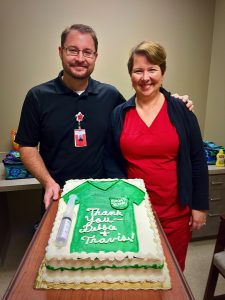
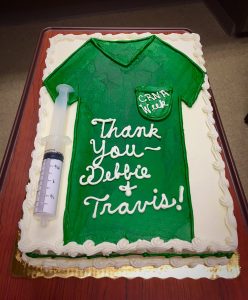
During CRNA week 2017, Travis Berry (’08) and Debbie Temple (’95) were honored at Associated Endoscopy in Hermitage, Tenn. The staff prepared a luncheon and presented a special “Propofol” cake to celebrate their work in nurse anesthesia.
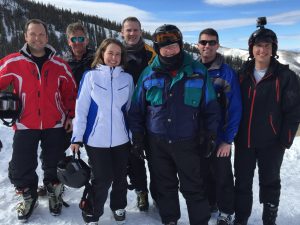
MTSA co-sponsored an alumni lunch with Holiday Seminars in Aspen, Colo., earlier this year. MTSA alumni attending include (l to r) Charles Hansen (’99), John Shields (’85/’05), Julie & David Murphy (’00), William O.T. Smith, MD, former MTSA president, Rich Maynard (’98), Richie Gambrell (’08), and Kevin Crawford (’83/’95 — not pictured). Aspen Anesthesia ’17 was held Jan. 29 – Feb. 3.
Former MTSA President receives honor
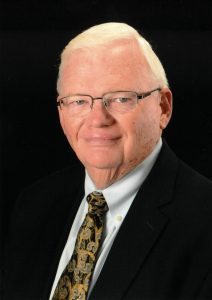
W.O.T. Smith, MD, former president of MTSA, was awarded Alumnus of the Year by the Loma Linda University School of Medicine Alumni Association. The award was presented at the 50th year alumni class reunion in recognition of his many years of education endeavors, including MTSA President and continuing education for CRNAs and anesthesiologists.
As an instructor for the U.S. Army, Dr. Smith developed the first computer-assisted teaching program in the Army Medical Department. He took an anesthesiology residency at the LA County Harbor General Hospital and LA Children’s Hospital. Moving to Tennessee, he became head of the School of Anesthesia at Madison Hospital, which became MTSA. He retired from his position in 2006.
In 1981, Dr. Smith founded Holiday Seminars, Inc., which has since provided continuing education credits for 15,000 anesthesia practitioners at locations around the globe. He retired from clinical practice six years ago and served as president of Holiday Seminars until 2014. He and his wife, Bonnie, live in Goodlettsville, Tenn.


